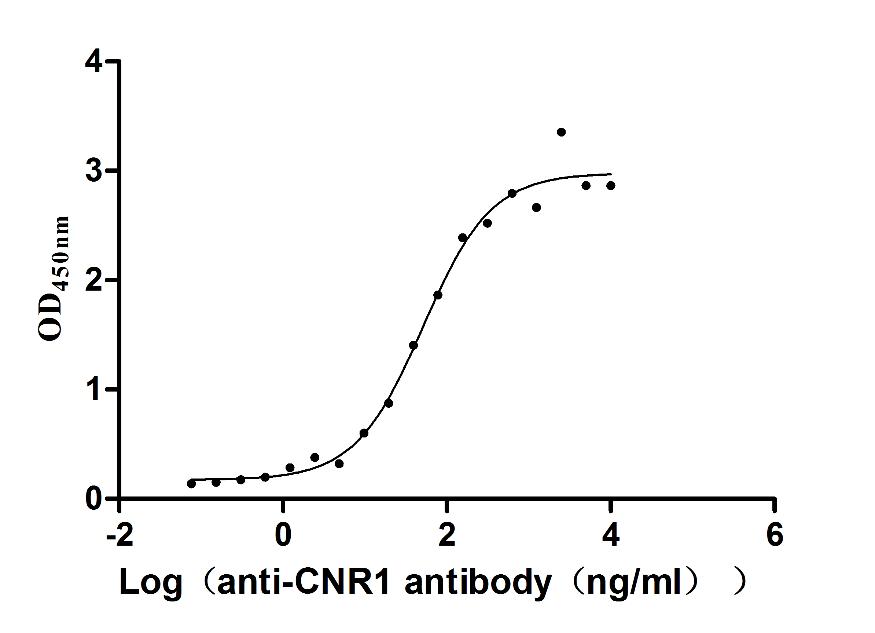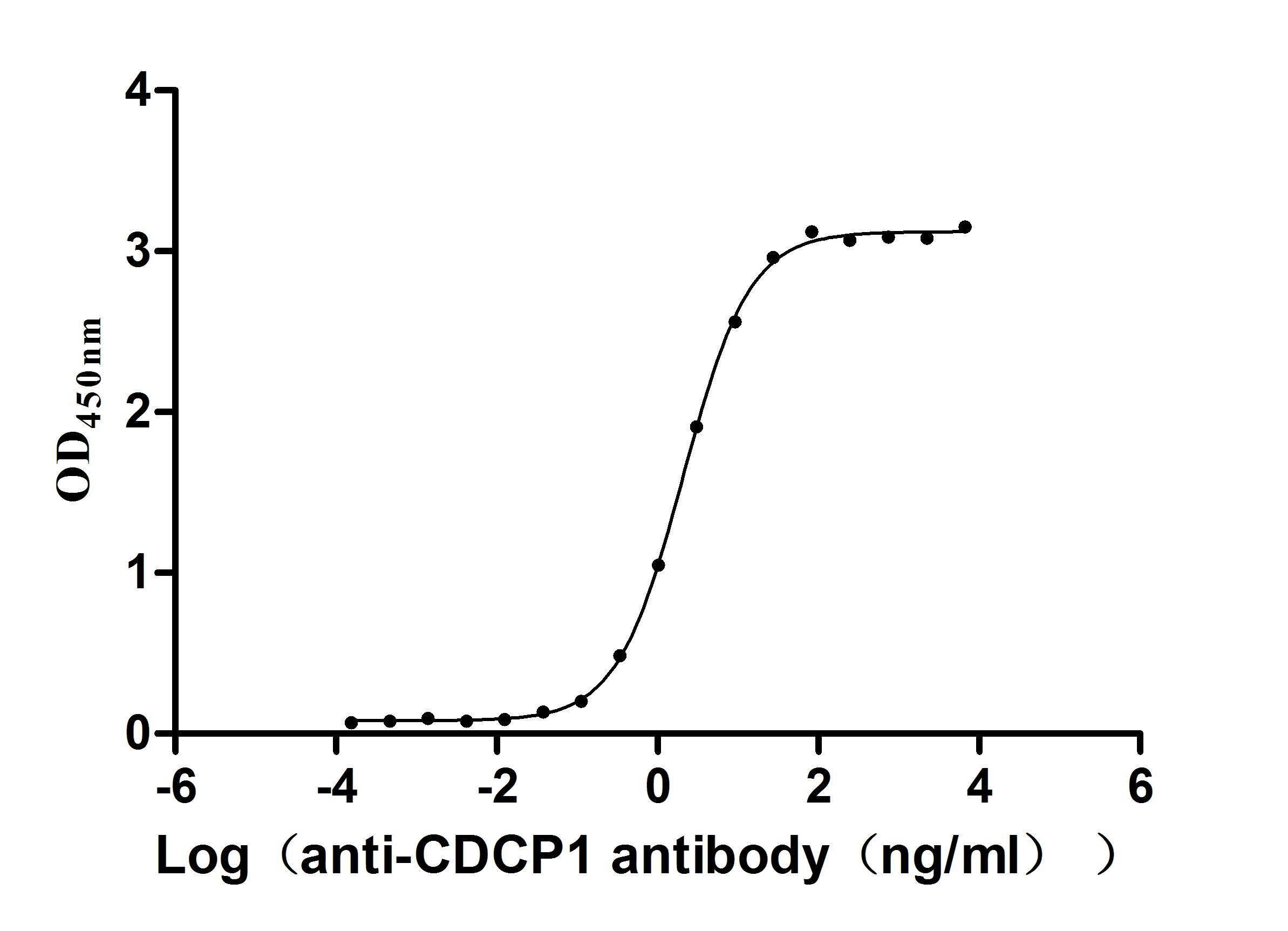Recombinant Human Phosphoenolpyruvate carboxykinase, cytosolic [GTP] (PCK1)
In Stock-
中文名称:人PCK1重组蛋白
-
货号:CSB-EP017613HU
-
规格:¥1344
-
图片:
-
其他:
产品详情
-
纯度:Greater than 90% as determined by SDS-PAGE.
-
基因名:
-
Uniprot No.:
-
别名:cytosolic [GTP]; GTP; PCK1; PCKGC_HUMAN; PEP carboxykinase; PEPCK-C; PEPCK1; PEPCKC; Phosphoenolpyruvate carboxykinase 1 (soluble); Phosphoenolpyruvate carboxykinase 1; Phosphoenolpyruvate carboxykinase; Phosphoenolpyruvate carboxykinase, cytosolic [GTP]; Phosphoenolpyruvate carboxykinase, cytosolic; Phosphoenolpyruvate carboxylase; Phosphopyruvate carboxylase
-
种属:Homo sapiens (Human)
-
蛋白长度:Full Length
-
来源:E.coli
-
分子量:73.2kDa
-
表达区域:1-622aa
-
氨基酸序列MPPQLQNGLNLSAKVVQGSLDSLPQAVREFLENNAELCQPDHIHICDGSEEENGRLLGQMEEEGILRRLKKYDNCWLALTDPRDVARIESKTVIVTQEQRDTVPIPKTGLSQLGRWMSEEDFEKAFNARFPGCMKGRTMYVIPFSMGPLGSPLSKIGIELTDSPYVVASMRIMTRMGTPVLEAVGDGEFVKCLHSVGCPLPLQKPLVNNWPCNPELTLIAHLPDRREIISFGSGYGGNSLLGKKCFALRMASRLAKEEGWLAEHMLILGITNPEGEKKYLAAAFPSACGKTNLAMMNPSLPGWKVECVGDDIAWMKFDAQGHLRAINPENGFFGVAPGTSVKTNPNAIKTIQKNTIFTNVAETSDGGVYWEGIDEPLASGVTITSWKNKEWSSEDGEPCAHPNSRFCTPASQCPIIDAAWESPEGVPIEGIIFGGRRPAGVPLVYEALSWQHGVFVGAAMRSEATAAAEHKGKIIMHDPFAMRPFFGYNFGKYLAHWLSMAQHPAAKLPKIFHVNWFRKDKEGKFLWPGFGENSRVLEWMFNRIDGKASTKLTPIGYIPKEDALNLKGLGHINMMELFSISKEFWEKEVEDIEKYLEDQVNADLPCEIEREILALKQRISQM
Note: The complete sequence including tag sequence, target protein sequence and linker sequence could be provided upon request. -
蛋白标签:N-terminal 6xHis-tagged
-
产品提供形式:Liquid or Lyophilized powder
Note: We will preferentially ship the format that we have in stock, however, if you have any special requirement for the format, please remark your requirement when placing the order, we will prepare according to your demand. -
缓冲液:If the delivery form is liquid, the default storage buffer is Tris/PBS-based buffer, 5%-50% glycerol.
Note: If you have any special requirement for the glycerol content, please remark when you place the order.
If the delivery form is lyophilized powder, the buffer before lyophilization is Tris/PBS-based buffer, 6% Trehalose. -
储存条件:Store at -20°C/-80°C upon receipt, aliquoting is necessary for mutiple use. Avoid repeated freeze-thaw cycles.
-
保质期:The shelf life is related to many factors, storage state, buffer ingredients, storage temperature and the stability of the protein itself.
Generally, the shelf life of liquid form is 6 months at -20°C/-80°C. The shelf life of lyophilized form is 12 months at -20°C/-80°C. -
货期:3-7 business days
-
注意事项:Repeated freezing and thawing is not recommended. Store working aliquots at 4°C for up to one week.
-
Datasheet & COA:Please contact us to get it.
相关产品
问答及客户评论
I wanted to mention a critical thing about this protein. It needs Manganese (Mn2+) to fold properly. We found that our in house protein was behaving strangely in the presence of inhibitors and this was due to the presence of aberrantly folded protein. We had prepared His tagged material and to purify it metal affinity chromatography was used which depletes the protein from any Mn2+. I would highly recommend adding MnCl2 (1-2mM) to the final product preferably immediately after purification. Particularly if you are using metal affinity resin (talon or some other). Even if you are not I would strongly suggest inclusion of Manganese in the final buffer prior to freezing and shipment.
And:
One other point. The enzyme has a very active cysteine residue in the active site that is required for catalysis. It needs to be reduced. So use DDT (2-5 mM) or TCEP (1mM) in the final buffer.
Please let me know if adding MnCl2 and DDT or TCEP to the final product will be possible.
靶点详情
-
功能:Cytosolic phosphoenolpyruvate carboxykinase that catalyzes the reversible decarboxylation and phosphorylation of oxaloacetate (OAA) and acts as the rate-limiting enzyme in gluconeogenesis. Regulates cataplerosis and anaplerosis, the processes that control the levels of metabolic intermediates in the citric acid cycle. At low glucose levels, it catalyzes the cataplerotic conversion of oxaloacetate to phosphoenolpyruvate (PEP), the rate-limiting step in the metabolic pathway that produces glucose from lactate and other precursors derived from the ...显示更多
-
基因功能参考文献:
- This study reveals a unique mechanism to suppress hepatocellular carcinoma by switching from glycolysis to gluconeogenesis through Nur77 antagonism of PEPCK1 degradation. PMID: 28240261
- circC3P1 acts as a tumor suppressor via enhancing PCK1 expression by sponging miR-4641 in hepatocellular carcinoma. PMID: 29608893
- The expression levels of PCK1 were suppressed in hepatocellular carcinoma (HCC) samples and in cells derived from HCC tissues. PMID: 29768256
- Study investigated the molecular basis of such effects focusing on a commonly studied polymorphism in pig Pgc1alpha, which changes a cysteine at position 430 (WT) of the protein to a serine (C430S); found that differential O-GlcNAcylation of Pgc1alpha regulates PCK1 activity and this molecular mechanism could explain at least in part the epistatic interaction between both genes. PMID: 28644880
- Study identified a novel homozygous PCK1 missense mutation causing cytosolic phosphoenolpyruvate carboxykinase deficiency presenting as childhood hypoglycemia. PMID: 28216384
- HBXIP is able to depress the gluconeogenesis in hepatoma cells by suppressing PCK1 to promote hepatocarcinogenesis, involving miR-135a/FOXO1 axis and PI3K/Akt/p-FOXO1 pathway. PMID: 27609066
- an extended binding site in the catalytic cleft of cPEPCK which is used by 3-MPA to inhibit cPEPCK non-competitively. PMID: 26528723
- A mutation of PCK1 associated with Smith-Magenis Syndrome, cytosolic PEPCK deficiency and NMDA receptor glutamate insensitivity. PMID: 24863970
- Insulin-dependent translocation of FOXO1 regulated transcriptional repression of PCK1 concomitant with the formation of the FOXO1-euchromatic histone-lysine N-methyltransferase2 (EHMT2) complex and histone modifications of the PCK1 promoter region PMID: 25736587
- Lipopolysaccharide and monophosphoryl lipid A also up-regulated G6PC and PCK1 transcript abundance in a TLR4-dependent manner. PMID: 23465595
- The PCK1 tag-single nucleotide polymorphisms influenced insulin resistance by interacting with plasma n-3 polyunsaturated fatty acids levels in metabolic syndrome patients. PMID: 23092637
- HCV core protein expression-mediated FOXO1 activation and the increased PGC-1alpha leaded to the elevation of PCK1 at the mRNA level PMID: 22489460
- Acetylation regulates the stability of the gluconeogenic rate-limiting enzyme PEPCK1. PMID: 21726808
- Data show PEPCK-C and CPT-1 mRNAs are more abundant in non-tumoral tissues than in the tumoral counterpart, whereas the opposite occurred for the FAS gene. PMID: 20691246
- Studies demonstrate the association between PCK1 and smaller average brain volume. PMID: 21152065
- Study in the EYHS cohort failed to identify an association of PCK1 polymorphisms with obesity, physical activity, and fitness. PMID: 20134411
- crystal structure of human cytosolic phosphoenolpyruvate carboxykinase reveals a new GTP-binding site PMID: 11851336
- Conserved amino acids within CCAAT enhancer-binding proteins (C/EBP(alpha) and beta) regulate gene expression PMID: 11997389
- promoter context may influence which domains within a transcription factor are employed to mediate transactivation of PEPCK PMID: 12237288
- the PGC- 1-regulated phospho(enol)pyruvate carboxykinase (PEPCK) promoter is a novel target promoter for SHP inhibition PMID: 12324453
- transcription of the gene for phosphoenolpyruvate carboxykinase (GTP) in the liver is regulated by SREBP-1c and Sp1 PMID: 14744869
- Promoter single nucleotide polymorphism in PCK1 was resistant to down-regulation by insulin in vitro and associated with type 2 diabetes mellitus. PMID: 14764811
- PCK1 has been implicated as one of many genes associated with type 2 diabetes mellitus [review] PMID: 15046742
- AUF1 binds to multiple destabilizing elements within the 3'-UTR that participate in the rapid turnover of the phosphoenolpyruvate carboxykinase mRNA. PMID: 15951444
- The multiple instability elements present within the 3'-UTR may function synergistically to mediate both the rapid degradation and the cAMP-induced stabilization of PEPCK mRNA. The latter process may result from a PKA-dependent phosphorylation of AUF1. PMID: 16144962
- Subjects with the PCK1-232G/G genotype had more carotid IMT (0.80+/-0.02 versus 0.73+/-0.03 mm; P=0.007) but less TPV (0.10+/-0.09 versus 0.38+/-0.13; P=0.03) than subjects with other genotypes. PMID: 16282543
- Significant association of single nucleotide polymorphism within three genes--PPARgamma, SOS2, and PCK1--with Alzheimer's disease, was confirmed. PMID: 17440948
- IFN-gamma exerts a tissue-specific action in rodents and humans, having glyceroneogenesis and the PEPCK-C gene as selective targets to intensify fatty acids release from adipocytes PMID: 17495004
- The effects of several variants of retinoic acid on the expression and activity of PEPCK in human, mouse, and rat adipose tissue are reported. PMID: 18492826
- Reduced CREB phosphorylation (Ser-129) associated with inactivation of GSK3beta by Ser-9 phosphorylation may be the major mechanism underlying PEPCK-C gene suppression by AMPK-activating agents such as biguanide PMID: 18801732
- The aromatic ring of Tyr235 in PEPCK helps to position PEP in the active site and the hydroxyl group allows an optimal PEP-Mn(2+) distance for efficient phosphoryl transfer and overall catalysis. PMID: 19021757
- Val184 of PCK1 gene might increase the risk of type 2 diabetes in eastern Chinese population with BMI<23 kg/m(2) via reducing the PEPCK-C activity. PMID: 19070910
- Study validated a predicted SP1 binding site in the control of PCK1 transcription using gel shift and reporter assays. PMID: 19329064
- study is the first to investigate the association between variants of the PCK1 gene and type 2 diabetes in South Asians PMID: 19725958
收起更多
-
相关疾病:Phosphoenolpyruvate carboxykinase deficiency, cytosolic (PCKDC)
-
亚细胞定位:Cytoplasm, cytosol. Endoplasmic reticulum.
-
蛋白家族:Phosphoenolpyruvate carboxykinase [GTP] family
-
组织特异性:Major sites of expression are liver, kidney and adipocytes.
-
数据库链接:




















